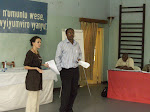Dear All,
We have been back in Malakal now for over a week and on Monday we made a trip out to one of the ECS school building sites in the town of kodok, we were luck enough to be able to tag along with a UN trip to take the British and French ambassadors there. This trip had been arranged so that the ambassadors could visit the site of the Fashoda incident – In a nut shell in case you didn’t know (I didn’t) A French force set out from Brazzaville under Major Jean-Baptiste Marchand with orders to secure the area around Fashoda as a French protectorate. After a long trek across central Africa Marchand’s expedition arrived in Fashoda (now Kodok) in 1898. However Sir Horatio Kitchener also arrived there and both sides insisted on their right to Fashoda. News of the meeting reached Paris and London, a crisis erupted and both nations began to prepare their fleets for war. It was resolved however when the French government decided they didn’t want to start a war with Britain and ordered its soldiers to withdraw. The ambassadors wanted photos where the stand off took place.
We were also able to visit the site of the new ECS school which is now in its early building stages, its taken a while to get started as the diocese prioritised the school they are building in Riang as its not accessible during the rains where Kodok is. We were able to fill the ambassadors in on the Episcopal Churches work in school building and education, I have attached a pic of the Group standing at the school site - Pic from left to right – Joseph Nding - Commissioner of Police for Fashoda County, Peter Maxwell – Head of the UN Mission in Sudan Sector 3, Zachariah – Director of Education for Fashoda County and ECS congregant member , British Ambassador Ian Cliff, Simon, Mme Robichon - French Ambassador, the next two men work for Fashoda County’s commissioner, John Chol – Episcopal Church Pastor for the area.)
I have also included a pic of Kodok Town – if you can believe it, I actually took it in the town centre.
Friday, 11 May 2007
Sudan Update 5
Dinka Christianity
Many of the people we work with in the Episcopal Church of Sudan are Bor Dinka, People of the Dinka tribe who originate from the place called Bor in Jongli State. The Dinka of Bor’s conversion to Christianity is fascinating; of all the tribal groups in South Sudan they represent the most complete religious transformation anywhere in Sudan in current times. There has been an almost total conversion of a people to a Christian identity within a 10 year period.
This seems to stem from the fact that the Bor Dinka probably suffered a more intense and complete destruction of their traditional culture and ways of life than any other people in South Sudan during the civil war. Government assaults and large scale Nuer cattle raids (Nuer are another Sudanese tribal group) in the early 90’s caused the total obliteration of the Bor Dinka cattle herds and consequently their livelihoods and very culture (cattle were fundamental to Dinka life, providing their livelihood, food and wealth). The majority of people were displaced into other areas and refugee camps where many remain today.
This experience led to a total revulsion against their traditional shrine spirits and resulted in the widespread destruction of all artefacts used for traditional religious practices. In February 94 in the town of Bor a vast number of these artefacts were collected together inside the church there and destroyed. Isaiah 18 became a key text of the Bor Dinka church’s identity as it holds a prophecy about Kush (translated ‘Sudan’ in the Good News Bible) which describes both suffering and eventual redemption and a turning to God.
We have just returned from a break in Egypt to Khartoum and plan to travel back to Malakal this week.
Will be in touch again soon
Best wishes
Keren
Many of the people we work with in the Episcopal Church of Sudan are Bor Dinka, People of the Dinka tribe who originate from the place called Bor in Jongli State. The Dinka of Bor’s conversion to Christianity is fascinating; of all the tribal groups in South Sudan they represent the most complete religious transformation anywhere in Sudan in current times. There has been an almost total conversion of a people to a Christian identity within a 10 year period.
This seems to stem from the fact that the Bor Dinka probably suffered a more intense and complete destruction of their traditional culture and ways of life than any other people in South Sudan during the civil war. Government assaults and large scale Nuer cattle raids (Nuer are another Sudanese tribal group) in the early 90’s caused the total obliteration of the Bor Dinka cattle herds and consequently their livelihoods and very culture (cattle were fundamental to Dinka life, providing their livelihood, food and wealth). The majority of people were displaced into other areas and refugee camps where many remain today.
This experience led to a total revulsion against their traditional shrine spirits and resulted in the widespread destruction of all artefacts used for traditional religious practices. In February 94 in the town of Bor a vast number of these artefacts were collected together inside the church there and destroyed. Isaiah 18 became a key text of the Bor Dinka church’s identity as it holds a prophecy about Kush (translated ‘Sudan’ in the Good News Bible) which describes both suffering and eventual redemption and a turning to God.
We have just returned from a break in Egypt to Khartoum and plan to travel back to Malakal this week.
Will be in touch again soon
Best wishes
Keren
Subscribe to:
Comments (Atom)

